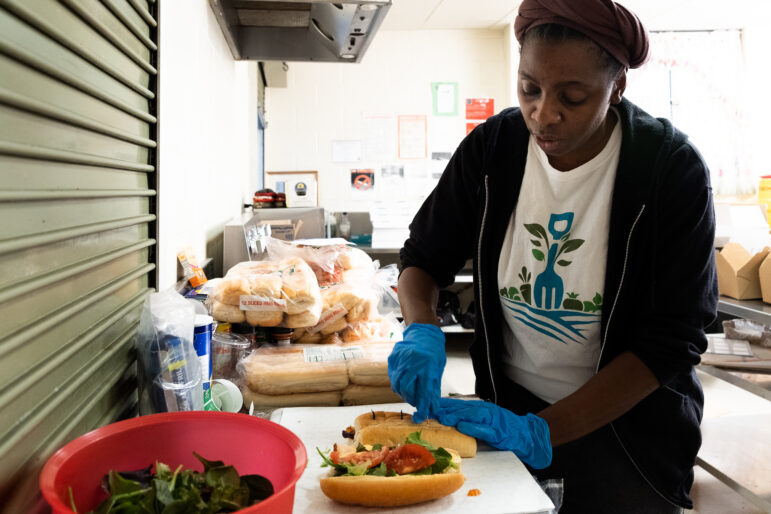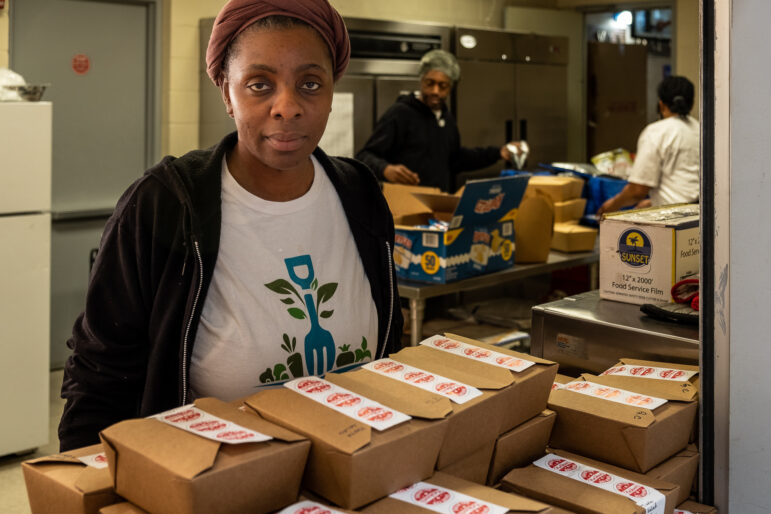Niani Taylor, who lives in Brooklyn’s Van Dyke Houses, is among the small but growing number of NYCHA residents who report income from self-employment. Advocates say the Housing Authority could foster more entrepreneurs by expanding initiatives like its Business Pathways program, which helped Taylor grow her catering company. “I put my all into it.”

Adi Talwar
NYCHA’s Food Business Pathways graduate Niani Taylor making sandwiches at the Van Dyke Community Center in Brownsville. Taylor and her team catered the food for a community baby shower event hosted by NYCHA.
On a recent Saturday, Niani Taylor spent close to 12 hours preparing and packing meals including pasta primavera salads, barbecue chicken sandwiches and bags of cookies for 350 people at two separate events.
Shopping, cooking and packaging is how Taylor, who has a catering business called Munch Hours, spends several days of her typical week. Though exhausting at times, Taylor said she is one step closer to her dream of owning a restaurant.
Taylor, who lives in Brooklyn’s Van Dyke Houses, is among the growing number of NYCHA residents who report generating income from self-employment. This pool of 1,636 tenants was much smaller just over a decade ago, when only 286 residents reported having a business of their own—a near 500 percent jump in the years since, according to policy organization Center for an Urban Future (CUF).
But it could be higher: business owners still make up less than 1 percent of NYCHA residents, compared to New York as a whole, where the share of self-employed workers was 9.8 percent in 2021. Entrepreneurship represents “an enormous untapped opportunity” to boost income among public housing residents, just 42 percent of whom were employed in 2019 before COVID-19 hit, as well as create opportunities for tenants to spend their money locally, CUF said in a January report.
Several initiatives are on the horizon to help increase the number of NYCHA entrepreneurs, whether they’re interested in creating a fall-back plan for their current jobs or to pursue a new field of interest.
In March, City Council Speaker Adrienne Adams shared a plan to support NYCHA business owners by expanding education programs, helping residents preserve capital and utilizing vacant spaces on NYCHA campuses to collaborate or host pop up shops. Last month, the Housing Authority partnered on another program to award start-up money to residents looking to get their ventures off the ground.
“There is immense potential everywhere in our great city,” Adams said when announcing her proposal last month. “To maximize it, we need to go to the communities that are ripe with talent but underrepresented in spaces of formal entrepreneurship.”
‘Something of my own’
Adams’ proposal specifically calls for expanding NYCHA’s Business Pathways program, which rolled out in 2015 and targets entrepreneurs like Taylor who can gain access to training courses, mentorship and guidance on how to grow a business.
Offered through NYCHA’s Office of Resident Economic Empowerment and Sustainability (REES), it’s currently limited to tenants working in catering and childcare services; Adams wants to grow it to include things like retail and cosmetology.
Taylor is one of 400 people to graduate from the program since its inception. She’s had a passion for cooking since childhood, and said she first thought of having her own food business during the economic crash in 2008.
“I was working full-time at a financial institution and thought having something of my own would be good to fall back on,” she said. Aside from the possibility of serving good dishes and joy to others, Taylor figured having a business could provide a safety net for her—and it later did.
“When I was laid off in 2019, I was able to pivot to catering,” she said.
Through the Food Business Pathways program, Taylor was connected with opportunities to cater dishes for NYCHA events, and she served some 2,000 NYCHA residents in Brooklyn in 2020 alone. Neighbors began to learn about Taylor’s services and even requested for her to cater private events, such as graduations.
In 2021, Taylor worked as a vendor at The Foodie Spot on Governors Island, where vendor spaces were set aside specifically for NYCHA-owned food businesses, part of a partnership between REES and the nonprofit Trust for Governors Island.
“I had to be on the ferry at 7 a.m., three days a week between July 1 and August 31,” Taylor said. She served meals like a kale tangerine salad—a customer favorite—and turkey meatballs topped with homemade mango barbecue sauce. “I put my all into it.”
Though Taylor now gets several requests a week via text and email for her services, there are still some hurdles. For larger orders, she needs to rent space at a community kitchen, which can cost hundreds of dollars for a single four or five hour shift. And though she wants to one day hire staff, she considers herself a “one man band” for now.
“Sometimes there are four orders a month,” Taylor said. “My last business partner couldn’t afford the inconsistency of payment.”
Despite the obstacles, Taylor said she is determined to expand.
“I’m hoping to one day have several locations in Brooklyn,” Taylor said. “Maybe even having a franchise to help disenfranchised people.”

‘A leg up‘
Editorial and Policy Director of CUF, Eli Dvorkin, suspects there are more budding entrepreneurs like Taylor across NYCHA, but that many operate under-the-radar and face financial obstacles to getting started.
“A vast majority haven’t been able to tap into any support for their business,” Dvorkin said. “Some folks struggle with savings, getting that initial capital, and seed funding is hard to come by.”
Among those hurdles: NYCHA and Section 8 residents must prove their income in an annual recertification process to ensure that no more than 30 percent of their income is being spent on rent, and reporting additional income from a self-started business can mean a bump in rent costs. Similarly, the Supplemental Nutrition Assistance Program (SNAP) has a recertification process every 12 to 36 months.
The fear of rent increases or the possibility of losing government aid like SNAP disincentivizes saving and entrepreneurship among NYCHA residents, CUF’s report argues.
Both the group and Speaker Adams have called for NYCHA to boost enrollment in its Family Self Sufficiency (FSS) program, which lets tenants who see a rent boost because of increased income deposit the difference between their old and new rent into an escrow/savings account.
Another program, NYC Boss Up, kicked off last month to provide a select group of public housing and Section 8 entrepreneurs with grants of up to $20,000 to get their businesses off the ground. It’s similar to the annual Power Up! Competition hosted by the Brooklyn Public Library, in which Brooklyn residents as young as 18 are eligible to win cash prizes and take three mandatory webinar classes to get their entrepreneurial careers to the next level.
Under NYC Boss Up, REES, the Brooklyn Public Library Business and Career Center and the Moelis Family Foundation granted a cohort of nine NYCHA entrepreneurs with startup prize money, contingent upon their finishing six two-hour business courses in the program.
An initial $5,000 is granted to the winners, and the remaining $15,000 is given after all classes are completed. The Business Outreach Center Network, an organization that supports entrepreneurs in New York City and Centro’s Basic Entrepreneurship, a training service to support startups, are spearheading the courses.
Candice Goree, who manages NYC Boss Up on behalf of the Molis Family Foundation, said the purpose of the program is to help give residents a “leg up” that they ordinarily may not have in the startup world.
This inaugural cohort represents talents across several different fields: There is an artist, a videographer, a cosmetologist and a mother-daughter duo who make healthy frozen treats, among others.
The winners were chosen from a group of nearly 300 applicants who submitted details about their business, budget plans and goals; of those, 26 applicants advanced to the second round, where they gave a four-minute pitch to a panel of judges.
“I know it can be pretty intimidating to pitch to people but everybody did such an amazing job, I wish we could’ve chosen all of them,” Goree said. “But from there the judges were able to narrow it down to nine.”
Temika Walker, who has a vegan skin care company called B4URSKN, was among the winners. “I got a call from Candice and was trying to hold it in because I wanted to cry,” Walker said.
For six months, Walker worked in her kitchen to find the perfect recipe for her hair and body butter, inspired by her Guyana roots.
After sampling her product to family, Walker decided to enter the Brooklyn Power Up! Competition in 2020. After being turned down, Walker tried again the following year, where she was awarded $1,000.
Walker continued to work by selling her products at pop-ups, managing a website and getting before and after photos of her customers. With her recent Boss Up win, she’s planning to grow her line to include a soap.
“Now that I have the $20,000, I can move on to my next product, find an investor and come up with a team,” Walker said.








